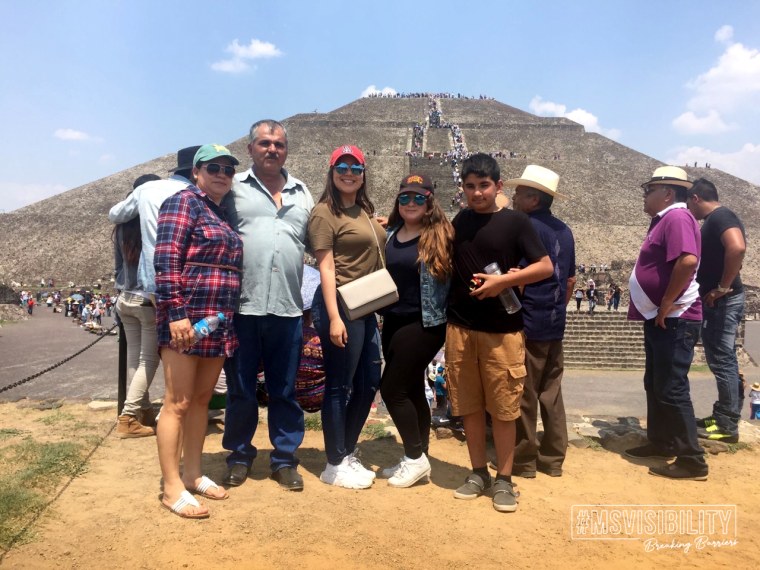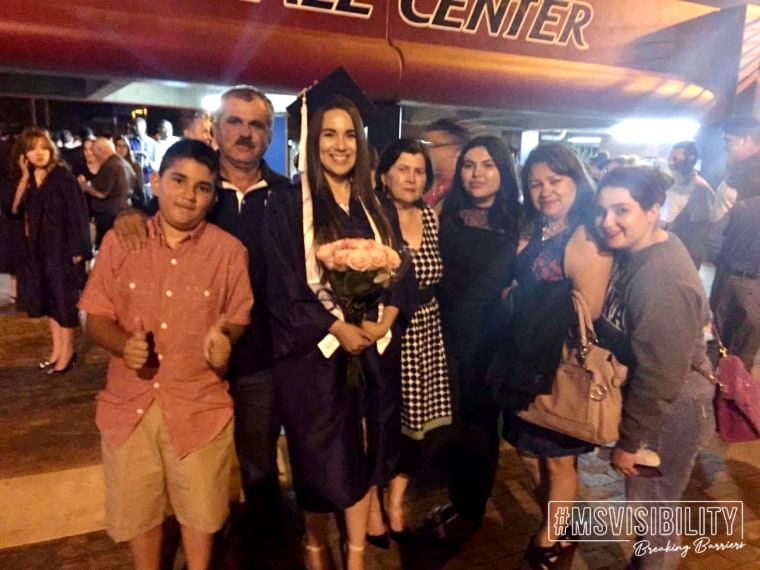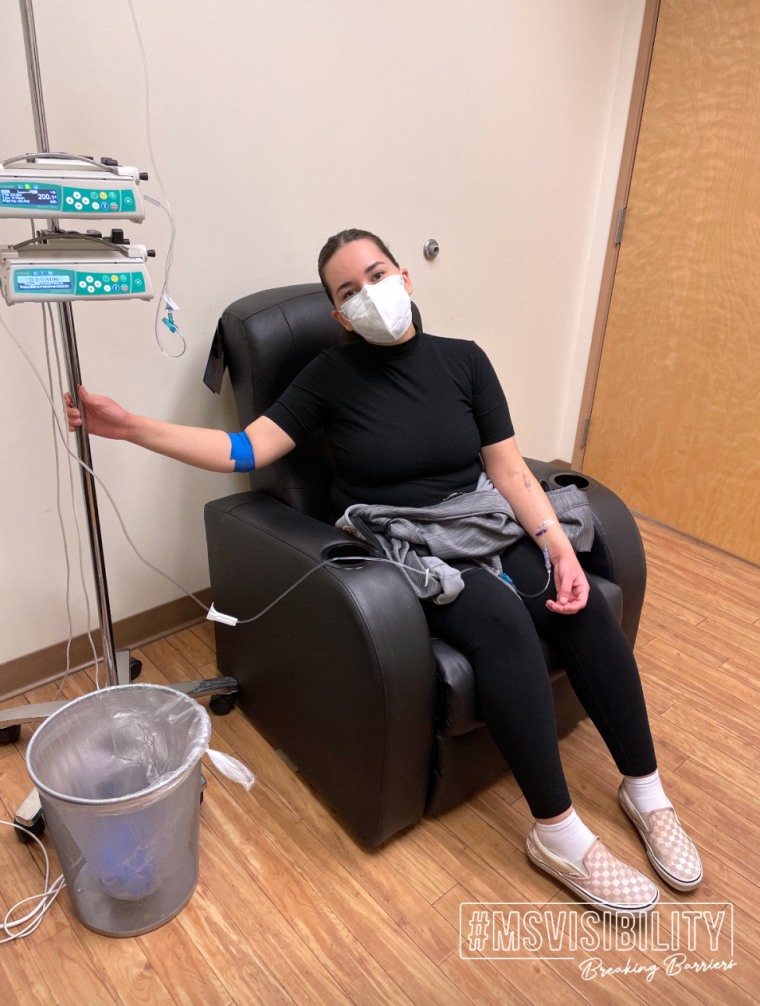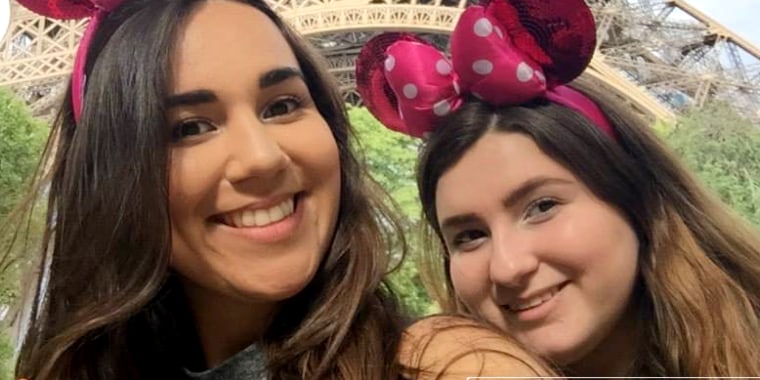As then 11-year-old Crystal Bedoya walked home with her sister, Catherine, she felt her body become numb. She hoped that she would improve, but her health only worsened.
“It was similar to that sensation that you get when your limbs fall asleep,” Bedoya, 28, from Arizona, told TODAY. “I started having to drag my leg. I started having to use my little sister, who was half my size, as a support to walk home from school. And it just didn’t get better.”
She soon learned what was wrong: She had multiple sclerosis (MS).
“It was basically confusion and shock, like ‘What is this?’” she recalled. “We had never heard of multiple sclerosis.”
An unknown diagnosis
When Bedoya first met with the doctors, she was diagnosed as having a brain bacteria. But her family thought she should have a second opinion and they traveled three hours away to visit a new doctor who diagnosed her with MS. Aside from not knowing what the condition is, Bedoya’s family faced another challenge — her parents did not speak English and she had to translate.

“That was such a huge responsibility,” she said. “It was difficult to have to handle all of these symptoms and all of these new things coming into my life as a little kid.”At 11, she had to figure out how to describe complex tests, such as MRIs, spinal taps and other medical terminology, to her parents. And, she needed to undergo invasive treatments. Doctors first prescribed a medication she needed to inject into her body.
“That was very scary — mostly for my mom because she would have to observe me do it correctly. But she couldn’t do it because she deals with tremors,” Bedoya said. “MS comes with tremors too so both of us were trying not to freak each other out trying to get me the medication.”
As Bedoya grappled with her diagnosis she was also going through puberty.
“I was trying to figure out my life, like who I was, and it was quite scary,” she said. “It makes me realize, ‘Wow, how did I do it? How did I navigate through this whole different realm?’”
For years, she tried to hide her condition. That could be tough because sometimes she experienced MS relapses so severe that she couldn’t walk without a cane, walker or a wheelchair. Often she felt isolated.
“It wasn’t until recently that I realized I should share,” she said. “I always felt so alone dealing with all of this.”
Living with MS for so long means that Bedoya has been on a lot of treatments. She normally takes a medication for as long as it manages her symptoms or stops lesions from forming on the brain. These lesions can cause more permanent damage and more symptoms. Right now she’s on a twice-yearly infusion, which she thinks helps her a great deal.
“It’s been quite difficult to have to go through all these different treatments because it takes a toll on your body,” Bedoya said. “But I’m happy where I’m at now.”
She started connecting with others online who have MS, who often refer to themselves as “MS Warriors.” Having a community has helped her understand what others go through and what’s similar and different between them. While her new treatment is helping her, she still struggles with chronic pain, bladder and sleeping problems. But she is more mobile.
“It feels nice to feel some stability because my MS has been very aggressive, very unpredictable. It’s exhausting” she said. “I always think to myself, ‘Will I be able to move today? Will my body work?’”
What is multiple sclerosis?
“Multiple sclerosis is a chronic immune mediated process where the immune system attacks the covering around the nerve cells that make up the central nervous system,” Dr. Kalina Sanders, a neurologist at Baptist Health in Jacksonville, Florida, told TODAY. “When a person develops multiple sclerosis, for most patients, they have relapses or attacks... The inflammatory activity determines what symptoms a person has.”

Sanders said it impacts about 1 million people in the United States and nearly 2.3 million people worldwide. The cause of multiple sclerosis is unclear, though research into potential causes is ongoing.
“We do feel that there are a combination of factors, including environmental exposures — that maybe be smoking or a vitamin D deficiency — exposures to previous viruses that tricked the immune system to be auto-reactive and the most commonly linked virus is the Epstein virus,” Sanders, who is an investigator for the CHIMES study, which examines MS in Black, African or Latino communities, explained. “We also think there is a genetic susceptibility.”
Symptoms can include:
- Vision loss.
- Muscle weakness.
- Sensory loss.
An MRI can detect lesions or plaques in the central nervous system, which helps doctors diagnose it. Early diagnosis can prevent MS from becoming more severe.
“Disease modifying therapies have proven to prevent relapses, have been proven to decrease the number of lesions that are occurring,” she said. “And (they) do have an impact on disability progression over time.”
Black, African American and Latino people are often diagnosed later because symptoms might look different in these populations or they may have less access to experts who recognize multiple sclerosis.
“Many of those patients are maybe misdiagnosed as stroke or other neurological conditions,” Sanders said. “The additional things that can delay the diagnosis are really more socioeconomic and so those patients maybe seek care less often. There’s cultural and there’s social issues.”
What’s more, language barriers might prevent some patients from seeking treatment or understand what doctors are recommending.
“The layered language barrier can be a huge barrier for the Hispanic and Latinx community,” Sanders said. “We have to be able to be a resource and make it easier and more accessible for patients.”
Sharing her story
Bedoya participated in the Breaking Barriers video a part of the #MSVisibility campaign sponsored by Genentech. She hoped to help other Hispanic and Latino people with multiple sclerosis, like she has benefited from sharing her story.
“With the MS community I’ve gotten support and love and we just feel very comfortable with each other. I feel like the connections that I’ve made there have been incredible,” she said. “We’re all living a different experiences.”

Bedoya also hopes that her story helps others avoid some of the negative challenges she faced.
“I struggled a lot with access to good health care because of barriers I had to deal with,” she said. “Lack of proper resources and language barriers when dealing with this disease is very different for everyone and I truly hope that things change because we should all have equal rights.”
